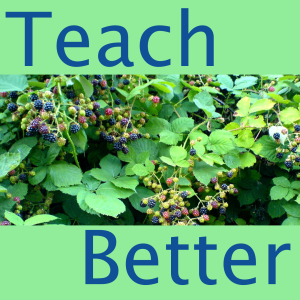
Podcast #25: Changing the Culture of Teaching with Noah Finkelstein
 2016-02-01
2016-02-01
Noah Finkelstein has a BS in Math from Yale and a Phd in Applied Physics from Princeton. He started teaching physics and studying how to teach physics during post-docs at UC San Diego and UC Berkeley. Now, he teaches physics and is a director at University of Colorado’s Center for STEM Learning, and he thinks hard about how to induce and sustain improvements in teaching across the university. In our wide ranging conversation, Noah shares his deep insights into what happens and what should happen in the classroom and at the institutional level. This is a good one.
You can subscribe to the Teach Better Podcast through your favorite podcast app or simply subscribe through iTunes if you don’t have one yet.
Show Notes0:00 ⏯ Intro
0:31 ⏯ Introducing Noah Finkelstein
1:23 ⏯ Yale’s undergraduate eduction as a model
2:46 ⏯ Anecdotal longitudinal evidence about the benefits of Yale education; Empowering individuals to engage society and to contribute to society; Fighting the “raw utilitarianism of workforce development that is reigning in education right now”
Carol Geary Schneider, President of the AAC&U (American Association of Colleges and Universities)5:38 ⏯ Noah and Doug geek out over undergraduate philosophy courses that blew their minds.
Martin Buber8:09 ⏯ Edward gets tearful hearing science-y types to sing the praises of the humanities.
11:12 ⏯ Physics learning goals at University of Colorado include things like “Develop scientific habits of mind.”
16:15 ⏯ We can’t reduce science education such that the human element drops out.
18:33 ⏯ How do we encourage teachers to explore teaching differently? Teaching is more than information: it’s changing the norms and culture of the classroom.
“Facilitating Change in Undergraduate STEM Education” by Andrea L. Beach, Charles Henderson, and Noah Finkelstein in Change: The Magazine of Higher Learning, Nov/Dec 2012 “Why Does the Faculty Resist Change?” by John Tagg in Change: The Magazine of Higher Learning, Jan/Feb 2012 “Use of research-based instructional strategies in introductory physics: Where do faculty leave the innovation-decision process?” by Henderson, Dancy, and Niewiadomska-Bugaj in Physics Education Research 2012 “Promoting instructional change: using social network analysis to understand the informal structure of academic departments” by Quardokus and Henderson in Higher Education 201522:20 ⏯ Clickers are an artifact, but turning to my neighbor and peer instruction, that’s culture, and that’s part of larger norms of the classroom. CS50 as changing the culture of the classroom at Yale and Harvard.
24:43 ⏯ Disciplines have conceptual tools, practices, and norms: it’s not just about tests. Noah wants to change the culture of the classroom: not just adding clickers or peer instruction.
28:56 ⏯ Is it the projectors that matter in the ‘smart’ classroom? Or the tables? Our learning spaces need to be about people.
30:27 ⏯ We often measure performance (including prior learning) rather than learning: so we’re just sorting students, not teaching them. But isn’t it the student’s responsibility to learn? Do we want a hierarchical society that limits the potential of our individuals?
34:14 ⏯ Should we “unbundle” college into parts like badging and certification? Liberal education aims to prepare students in broader ways and there is value in everyone being in the same physical location and taking classes in classrooms with friends.
Minerva Schools at KGI The End of College by Kevin Carey37:15 ⏯ Mediated communication has downsides, but we can address them. Some of the best learning Noah did in his Yale philosophy class was not inside the classroom. Conversations amongst strangers are more challenging.
39:55 ⏯ Technology stretching time and space is useful, but the bandwidth is lower than face-to-face communication. Saying “no” to the naivete of unfettered belief in technology.
Milgram Experiment49:58 ⏯ Let’s be scholarly about how we evaluate teaching. The students’ voice is incredibly important, but we’re generally asking students the wrong questions in course evaluation forms.
52:26 ⏯ Doug is inspired for department-level change.
55:48 ⏯ Something that did not work out so well in Noah’s teaching.
58:12 ⏯ We can’t substitute technology for engagement. Where does light get the energy to speed up when leaving a pane of glass?
1:00:20 ⏯ Just telling people ‘clickers work’ is not enough. We need to define good teaching together. We negotiate meaning–inside and outside the classroom.
The definitive article on the benefits of active learning by Freeman et al: “Active learning increases student performance in science, engineering, and mathematics” in PNAS, 2014More Episodes
Create your
podcast in
minutes
- Full-featured podcast site
- Unlimited storage and bandwidth
- Comprehensive podcast stats
- Distribute to Apple Podcasts, Spotify, and more
- Make money with your podcast
It is Free
- Privacy Policy
- Cookie Policy
- Terms of Use
- Consent Preferences
- Copyright © 2015-2024 Podbean.com





